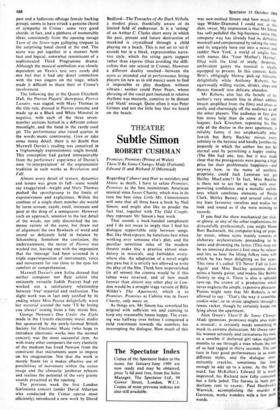THEATRE
Subtle Simon
ROBERT CUSHMAN
Promises, Promises (Prince of Wales) There'll Be Some Changes Made (Fortune) Edward II and Richard II (Mermaid) Regarding Cabaret and Hair as outriders and Mame as death, I have to salute Promises, Promises as the best mainstream American musical since Sweet Charity, which was in its turn the best since Little Me. Connoisseurs will note that all three have a book by Neil Simon, and might also like to ponder the fact that, together with The Odd Couple, they represent Mr Simon's best work.
That sounds a back-handed compliment and I do not mean to imply that I find his dialogue supportable only between songs. But, like Shakespeare, he functions best when working over someone else's plot, and the peculiar unwritten rules of the modern theatre make this a practice almost man- datory in musicals, and forbidden every- where else. An adaptation of a novel might just pass but it is strictly not allowed to write the play of the film. Think how impoverished (in all senses) the cinema would be if this taboo were reversed, and of how Much funnier than almost any other play in Lon- don would be a straight stage version of Billy Wilder's The Apartment, which is to Promises, Promises as Cabiria was to Sweet Charity, only more so.
As things are, Mr Simon has reworked his original with sufficient wit and cunning to keep any reasonable house happy. The even- ing was halfway over before I conquered a mild resentment towards the numbers for interrupting the dialogue. How much of this
was new-minted Simon and how much vie. tage Wilder-Diamond I could not, at this date, swear. My impression is that Mr Simon has soft-pedalled the big-business satire (the company way has already had its definitive musical) and compensated by taking the story and its ungainly hero out into a newer and sadder New York, a world of singles bars with names like 'Your Mother's Hairnet', filled with the kind of seedy, desperate, ambivalent gaiety the musical is ideally equipped to present. In this context, Kelly Britt's obligingly blowsy pick-up blossoms delightfully while Anthony Roberts. her equivocally willing victim, drinks, sings and dances himself into delicate abandon.
Mr Roberts also has the benefit of his author's very smooth line in direct address (much amplified from the film) and plays as easily and charmingly off the audience as off the other players. The audience in fact give him more help than do some of his col- leagues. Jack Kruschen, repeating his film role of the doctor in the next apartment, is reliably funny if too emphatically joke- Jewish but Betty Buckley misses every subtlety in the heroine and hardly justifies the jeopardy in which the author has put his eternal soul by permitting a happy ending. (The film had one, too, but it was made clear that the protagonists were paying a high price for their problematic happiness—and anyway how, in the name of aesthetic propriety, could Jack Lemmon not get Shirley MacLaine?) In fact, Miss Buckley is there not to act but to sing with over powering confidence and a metallic stylish- ness which combines elements of Petula Clark, Shirley Bassey, and several other of my least favourite vocalists and makes her look and sound as if she were miming to records.
If you find the show mechanical (or slick, or glossy, or any of the other euphemisms for distastefully professional), you might blame Burt Bacharach, the computer-king of popu- lar music, whose score mainly consists of elaborate orchestrations pretending to be tunes and drowning the lyrics. (This may not be an unmixed disaster.) Just once he relaxes and lets us hear the lilting folksy tune with which he has been delighting us for years.
This time it's called Never Fall in Love Again' and Miss Buckley quietens down, seizes a handy guitar, and makes like Bobbie Gentry to sing it. There is also a splendid rave-up, the crown of a production which never neglects the simple, expensive pleasures. Purists might note that Mr Roberts is not allowed to say : 'That's the way it crumbles, cookie-wise', or to strain spaghetti through a tennis racket, though he certainly keeps one lying about the apartment.
Alun Owen's There'll Be Some Changes Made (promises, promises) might also make a musical ; it certainly needs something to mask its extreme dislocation. Mr Owen takes his women seriously and caricatures his men, so a sensible if sheltered girl takes eighteen months to see through a man whom the rest of us had tagged in thirty seconds. The cast turn in four good performances in as many different styles, and the dialogue inter- mittently crackles, sometimes for long enough to add up to a scene. At the Mer- maid, Ian McKellen's Edward II is much improved, his Richard now fully consistent but a little jaded. The barons in both pro- ductions rant to excess: Paul Hardwick s Warwick, accomplishing the murder of Gaveston, works wonders with a few (toe words.










































 Previous page
Previous page